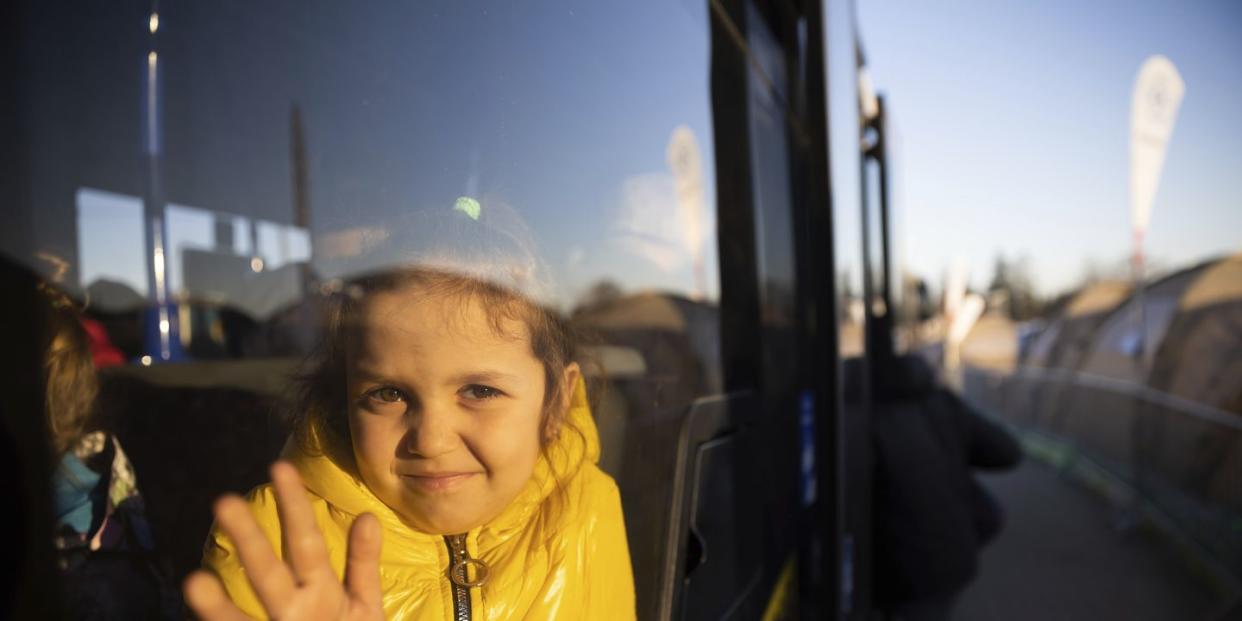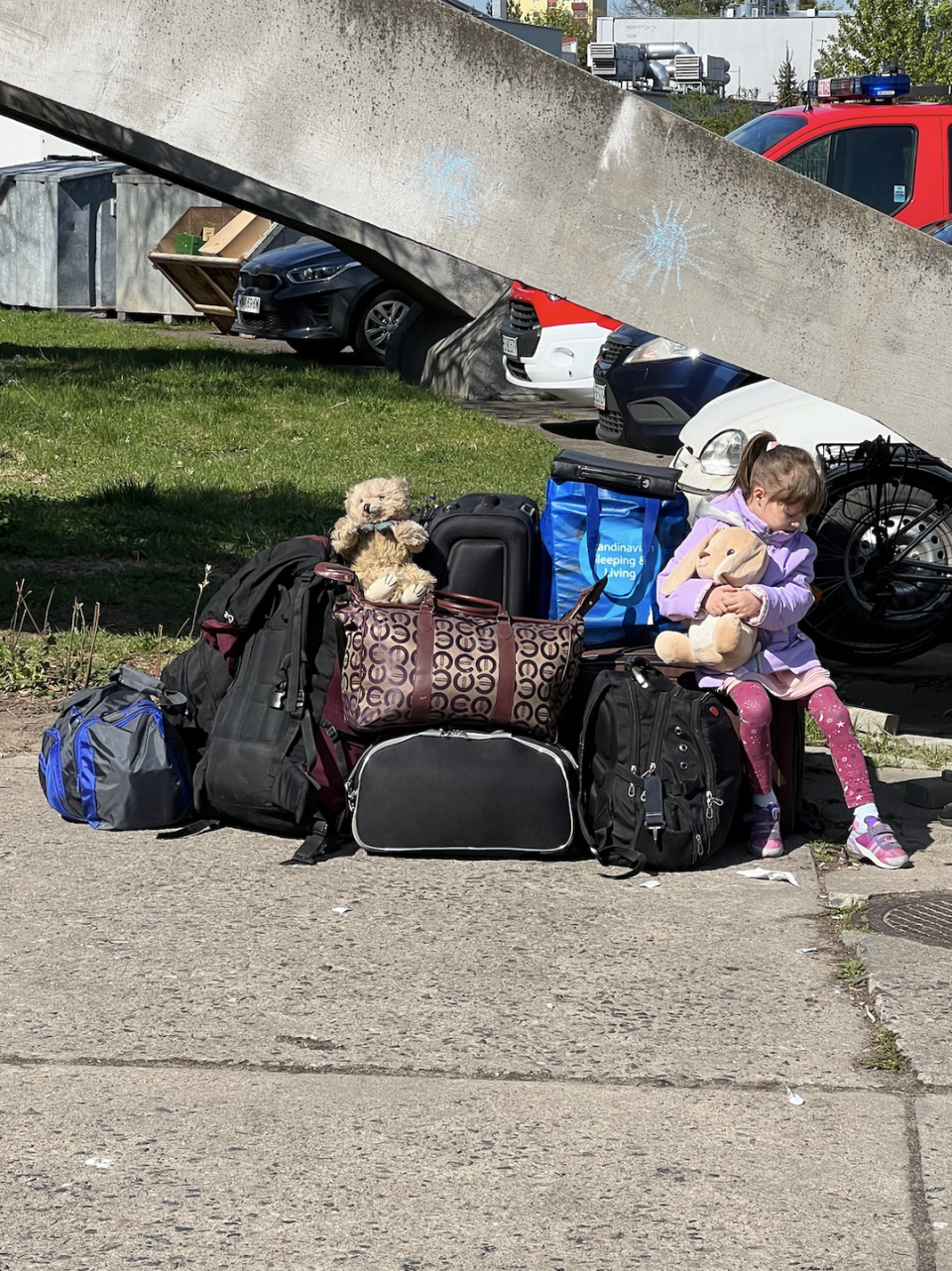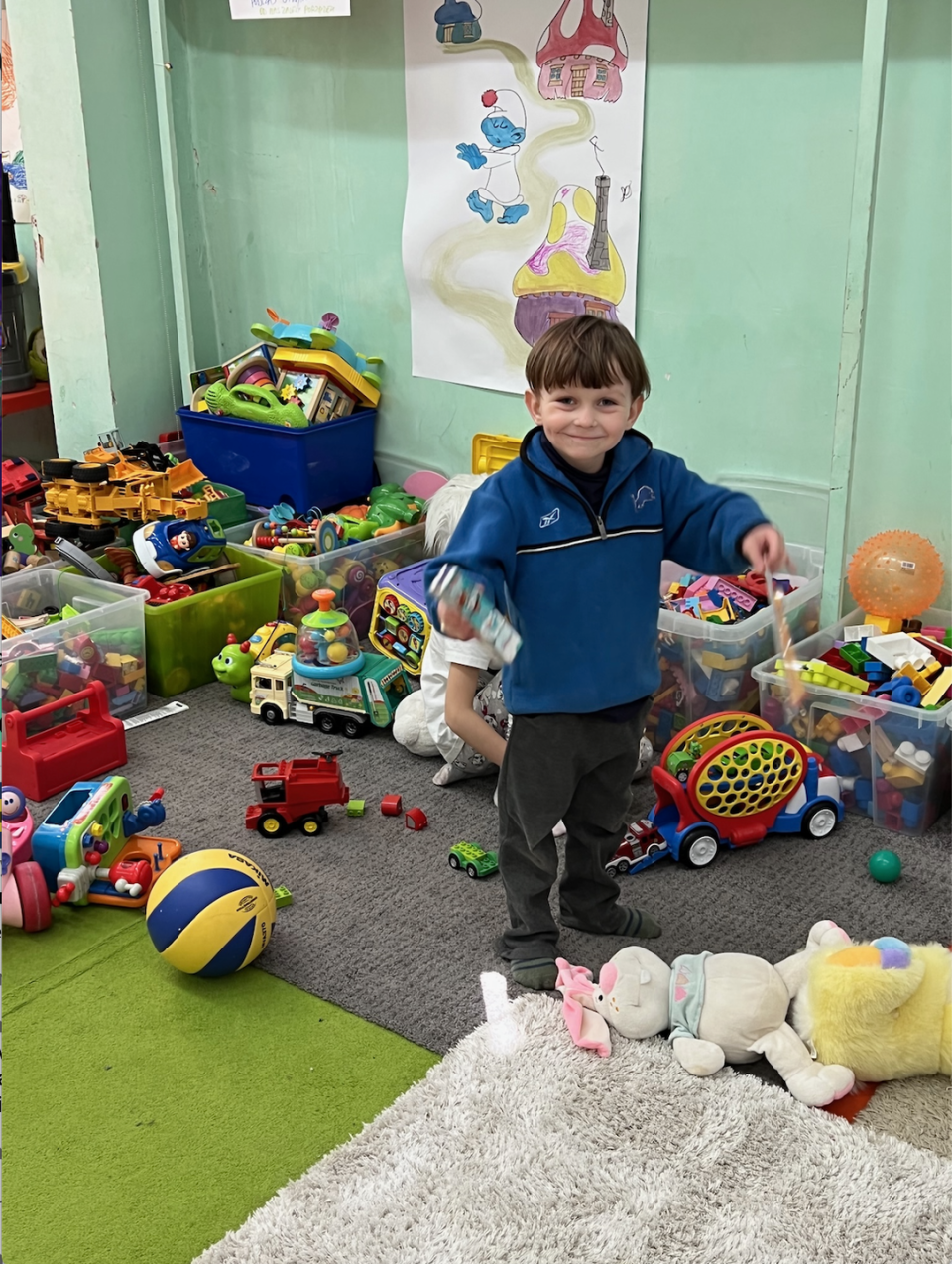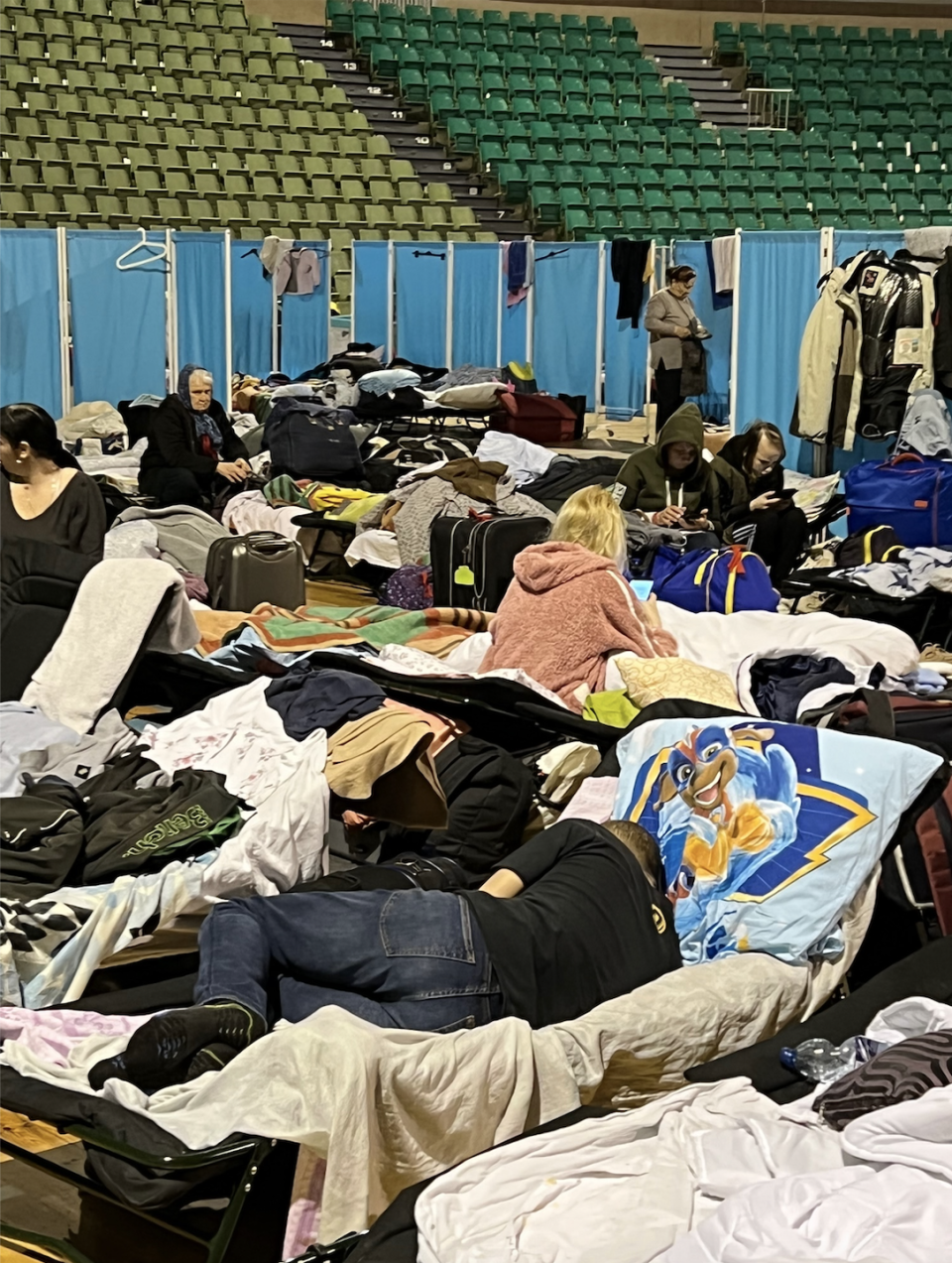Philanthropist and Writer Michael Clinton Offers a Hand to Ukrainian Refugees in Poland

"Hearst Magazines and Yahoo may earn commission or revenue on some items through the links below."
As I approached the Hala Arena Ukrainian refugee center in Poznan, Poland, I was initially struck by how quiet it seemed. Then my eyes landed on a lone girl hugging a teddy bear atop a pile of suitcases; she would be only the first of many weary children and mothers I would encounter during a volunteer trip I took in May.
A burning sense of empathy and sadness had compelled me to take action. As I sat at home, heart-wrenching images of families being torn apart and people being forced to leave Ukraine in droves—on trains, in buses and cars, and even on foot, with only the belongings they could carry—made it impossible for me to turn away.
To figure out what I could do, I reached out to my friend Mariusz Szeib, a local business leader in Poznan. He and I had met when we ran the Antarctica Marathon in 2014, fulfilling our mutual goal of running seven marathons on seven continents. Throughout our journey on the ship that carried us from Ushuaia, Argentina, to Antarctica, we bonded and celebrated with other runners who were completing the “7 on 7.” We also realized we had another shared passion: a dedication to service and giving back to others. Mariusz has sponsored nine charity runs to raise money for Syrian refugee children in Lebanon, a school in Rwanda, and more. In 2010, a group of like-minded friends and I launched the Circle of Generosity, a foundation whose mission is to grant random acts of kindness to individuals and families in need. In the past 12 years, we have extended help to people around the world—from widows of Sherpas killed in avalanches in Nepal to Americans affected by natural disasters and others who find themselves in moments of difficulty. Mariusz and I had stayed in touch over the years, and I turned to him when I decided I wanted to travel to Poland.
He told me that Poznan, Poland’s fifth-largest city, had already received 40,000 Ukrainian refugees, with more arriving daily. I told him that I thought Circle of Generosity could help there, and Mariusz offered to be my guardian angel on the ground, setting up meetings and arranging volunteer time. My itinerary was set.
Poznan, I discovered, is a charming city in Western Poland. Founded in 1253, it is home to multiple universities and a wonderful Old Town, and it’s one of the four historical capitals of medieval Poland. Mariusz was not only born in Poznan—it is where he got married, raised his family, and launched a successful apparel and textile business that continues to thrive.
At first glance there, life felt surprisingly normal given the influx of people and the war going on right next door. There were strolling families, people bustling to and from work, kids wearing hoodies while listening to their earbuds—scenes you’d see in any big city. I discovered that the refugees were mostly centralized in two main centers, the Arena and the Poznan fairground in the city center, where they were beginning the process of being assimilated or moved to other parts of Poland.
I met with the president of the city council, Grzegorz Ganowicz, and deputy mayor Mariusz Wisniewski to learn how Circle of Generosity might be of aid. This led to meetings with Warto Razem, a small NGO devoted to assisting the Ukrainian refugees with basic services, and with Caritas, a nonprofit representing the 43 church regions that were running the fairground shelter and many other initiatives. Both organizations rely on funds from donors, foundations, and businesses.
As a long-standing member of Lions International in Poznan, Mariusz also put together a group of local, service-minded business leaders from whom I could get practical advice on how best to deploy resources.

I wanted to see for myself what refugees and workers at the Arena needed. When I got there, I was met by guards who escorted me through a series of security checkpoints, including proof of vaccination. It was there that I was introduced to Karolina, the volunteer leader whose team was working with the women, children, and elderly who had taken shelter there, seeing to their most basic needs.
This particular shelter is run by one of the 16 regional governments in Poland called Wielkopolska, and while it does have a degree of financial support, it relies heavily on donations of goods and a Facebook page that identifies what might be in short supply at any given time—whether that be milk, fresh vegetables, or something else.
When I toured the arena, I was surprised by how quiet it was. Families were set up in small groupings on cots and blankets, their backpacks and suitcases surrounding them. Most of the mothers looked stressed and grief-stricken as they whispered to each other or spoke softly on their phones, perhaps to husbands back in Ukraine who had become soldiers of war.

Most of the children were silent, too, even in the makeshift playroom that housed toys that had been donated, and whose walls were decorated with drawings made by the kids in the shelter. A small boy of 5 or so smiled wearily at me, holding up a toothbrush and toothpaste as if to show me that he at least had these essential amenities.
I set to work in the shelter’s clothing distribution center with a group of volunteers, including Magda, a chemist by profession, and Anya, a city employee; I found out that all had been given time off from their employers to perform a day of service.
We sorted clothes that had been donated and stacked them on shelves where people could rummage through and find what they might need. It was in that small space that I was able to talk to some of the refugees, usually through a translator.
Most were still in a state of disbelief. While the majority said that they wanted to go home to Ukraine, they also acknowledged there wasn’t a home to return to. Some were in the process of deciding whether they should stay in Poland or move on to other countries, but said that they were taking it day by day.
Throughout my stay, I marveled at how incredibly generous the Poles were in welcoming the displaced into their community, perhaps remembering what had happened to their own country during World War II. The city council president referred to them as “our guests from Ukraine,” and like many others, he, too, had taken a Ukrainian family into his home for refuge.

My takeaway was that the citizens of Poznan and Poles generally have been incredibly organized in this enormous humanitarian effort, although the needs are great and continue to overwhelm. The generosity and kindness with which the Ukraines are met were humbling and inspiring to see.
In both refugee centers, Ukrainians are registered and given ID numbers so they can work in Poland. In Poznan, the city is providing free public transportation vouchers, and phone cards are being handed out. Free psychological counseling is being offered, and a center to help locate permanent housing and other support based on a family’s need has been established.
At the Caritas-run center in the fairgrounds, 2,000 meals a day are being served, and there are paid workers and volunteers on hand 24/7. At Warto Razem, though, I was told that the facility often ran out of food, and that families with elderly or disabled members were having trouble locating more permanent housing. During our visit, they were working on finding a place for 30 families to live, telling me that a hostel could put up several people for $250 per month. Anastasia and Jana, who met with me there, explained that some families had children with disabilities or elderly relatives and they were having a hard time helping them get settled.
I also learned that as most Ukrainians don’t speak Polish, there are volunteer organizations cropping up to teach the language, to help students enroll in schools, or to assist in simple everyday needs like setting up doctor visits or ensuring that prescriptions get filled.
So many of us have the luxury of knowing that fulfilling our everyday needs won’t be a struggle. But my trip to Poznan was a stark reminder that we are all vulnerable in one way or another, and we are all dependent on one another. I left Poland wishing I could help in an even bigger way. I still well up when I recall the grieving mothers I met managing to comfort their children, assuring them that everything would be fine despite the circumstances.
I’m proud that Circle of Generosity was able to contribute in some way. In the weeks since my trip, we’ve made donations to Warto Razem, Caritas, and Lions in the hope that we can ease some of the suffering and instability the refugee families are experiencing, in partnership with Mariusz, who really is like a guardian angel.
The greatest gift I received was that my trip to Poland enhanced my own sense of compassion and commitment to serving others, and made me want to do more. If we all do our parts and care for each other, we can manage any crisis. Our own small gestures accumulate and build on all the other small gestures that others are making. What we as individuals do really does make a difference.
Michael Clinton is the cofounder of Circle of Generosity and the author of Roar: Into the Second Half of your Life, which focuses on meaning and purpose for that time of life. He holds a masters degree in nonprofit management/philanthropy from Columbia University. You can find him on roarbymichaelclinton.com.
You Might Also Like

